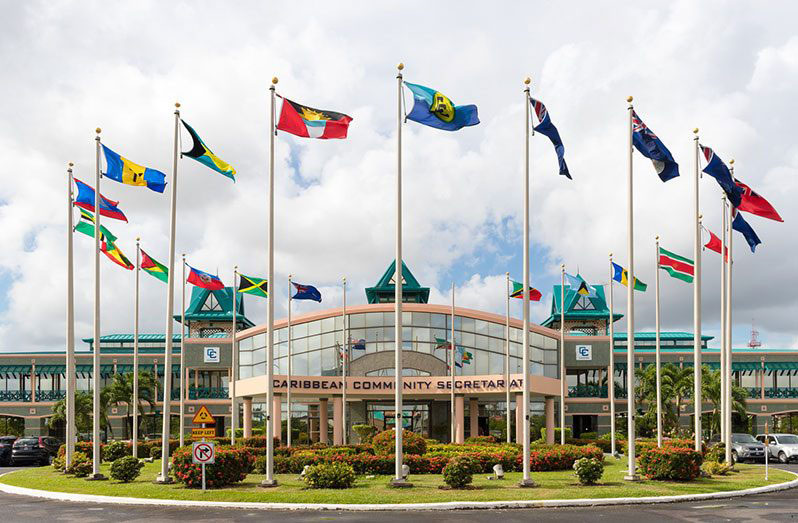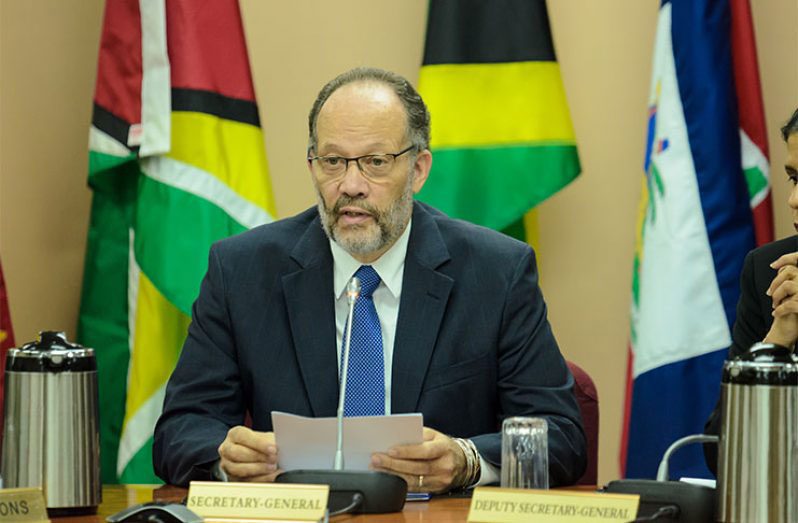— as finances decline by 25 per cent
OUTGOING Secretary-General of the Caribbean Community (CARICOM), Ambassador Irwin LaRocque has recommitted to restructuring of the organisation’s Secretariat, located here in Guyana, at Liliendaal, Greater Georgetown.
In a statement to commemorate CARICOM Day 2021 on Monday, July 5, 2021, LaRocque pointed to the resource constraints, highlighting the fact that during his 10-year stint at the helm of CARICOM, the secretariat “has had to do more with less.”
“The financial resources available to the secretariat have declined by 25 per cent, due largely to a decline in donor resources,” LaRocque said.
The Dominican national explained that the dwindling of financial support resulted in an expected decline in the staff headcount of the secretariat. At the same time, however, LaRocque said that the demand and output of CARICOM and its secretariat have not declined; rather, these demands have increased.
“…due to the dedication of staff and introduction of greater efficiencies in the manner in which we work; this is part of the reform process of the secretariat,” LaRocque said.
He also referenced a 2012 assessment of the secretariat’s systems and processes which had resulted in proposals for a redesign and restructuring of the agency’s business operations. LaRocque, whose two-term tenure comes to an end in August, said that some of the recommendations highlighted in the final assessment report have already been implemented.
“The objective is to make the secretariat more efficient, strategic, agile and effective,” LaRocque emphasised.

In January 2012, Landell Mills Limited released a report titled, ‘Turning around CARICOM: Proposals to restructure the Secretariat.’ In the report, the authors, Richard Stoneman, Justice Duke Pollard and Hugo Innis outlined that CARICOM was already “in a fight for survival.”
The report indicated, however, that with fundamental changes in its operations and structures, CARICOM can still turn around its reputation and go on to prosper. “These changes need to be accompanied by significant early results which are widely perceived as beneficial,” the report said.
The report also highlighted the requirements for a positive outcome, which it specified, would include the full and unequivocal support for member states; targeting the delivery of a narrow range of specific, practical and achievable benefits over a reasonably short time horizon; a credible reorganisation and strengthening of the CARICOM construct, including the Secretariat and CARICOM institutions, focused on the management of implementation.
The report said that it is essential that the Region settle on clear priorities as to what measures it can and cannot take. “For CARICOM to be turned around successfully, both stakeholders and interested parties need to become more realistic about the insurmountable constraints of geography, lack of size and complexity faced in developing a successful regional construct in the Caribbean,” the report said.
It noted that while the constraints impose limitations on what can be done and the speed at which it can be done, the fundamental challenge is to address the plethora of weaknesses in the CARICOM construct to make it a more progressive organisation.
WEAKNESSES
As far as the actual weaknesses go, the report said that these include the “often ill-disciplined way CARICOM conducts its business, the increasingly loose structure binding CARICOM’s organs and institutions, and the longstanding and growing difficulties in the Secretariat itself.”
According to the report, CARICOM’s difficulties are significantly multiplied by the continuing economic crisis being faced by the Region. More specifically, the report said that CARICOM’s Secretariat has lived from “hand-to-mouth in budgetary terms” for the decade preceding 2012.
It was explained that the “saving grace” for CARICOM is that there remains, by and large, a well of commitment both to it, and to regional integration as a principle, if not in practice.
Further, the report said that the influences of a rapidly changing world are beginning to test that commitment in some of the more “geographically peripheral” member states. “The same is true throughout the Region as a result of increasing disillusion between the perceived promises of CARICOM and the reality.”
The 2012 report advised too, that an important way of tackling growing disillusion head-on is for the relevant authorities, both CARICOM and its respective member states, to be much clearer about both the benefits CARICOM is offering, and when these can be delivered.
“We were, for example, under the misapprehension during our initial visits to member states, that the goal of the Single Market was free movement of goods between CARICOM member states in exactly the same way as there is free movement in the European Union,” the authors of the report said.
It was related too that once the necessary agreements, infrastructure and plans are in place to meet the needs of CARICOM, there should be a major relaunch aimed, in particular, at the general public in member states and at the international community.
It is hoped that the implementation of even more of the report’s recommendations could be realised under the tenure of incoming CARICOM Secretary-General Dr. Carla Natalie Barnett, a Belize national who would not only be the first woman to hold the Secretary-General post, but the first Belizean as well.




.png)









